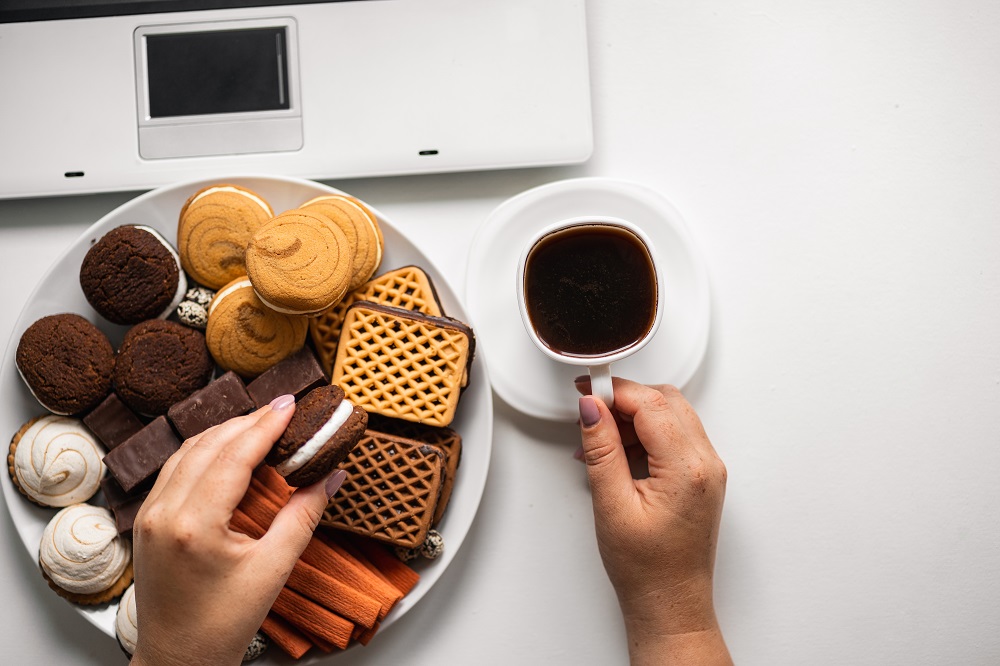Sometimes after a particularly hard day, we may find ourselves indulging in our favourite treat to feel a little better. While this is fine occasionally, doing this too frequently will have a negative impact on your health. In fact, if you find yourself eating more during a busy or difficult period, you may be stress eating without even realising it.
What is stress eating and why does it happen?
Stress eating (also known as emotional eating) happens when we rely on food to cope with strong emotions. Typically triggered by stress, anger or sadness, we tend to overeat when stress eating because we are eating to deal with our emotions rather than in response to physical hunger.
There are both physiological and psychological reasons for stress eating. In stressful situations, our brain sends out cortisol, which is primarily responsible for our fight-or-flight response. Higher cortisol levels may also lead to increased appetite. This, coupled with the comfort that our favourite snacks give us, may explain why we stress eat.
Strategies and tips on coping with stress eating
Strategy 1: Learn how to manage stress
Rather than relying on food as an emotional crutch, proper stress management techniques will help us deal with the root of the problem. Easy ways to start are to:
- Sleep well: A lack of sleep results in a rise in the levels of cortisol the next day. It also impairs your work performance and ability to make better decisions. This could, in turn, result in more stress down the road. Additionally, getting sufficient rest gives you the energy and alertness to get through the day, while also improving your mood tremendously.
- Meditate: Meditation is an excellent way to counter stress, as it helps you better understand and control your emotions. A meditation session can last anywhere between 5 minutes to 2 hours, and there are many guides you can refer to online. If meditation seems too difficult to dive into immediately, start with practising mindfulness in your daily life.
- Exercise regularly: Light to moderate exercise can help your body produce serotonin, also known as the happy hormone. Serotonin promotes the feeling of well-being and stabilises our mood. For an added boost to both your mood and the intensity of your workout, consider exercising with a friend.
Strategy 2: Restrict access to unhealthy snacks
As the saying goes “out of sight, out of mind”, there’ll be less temptation to snack if they’re kept away from you when your mouth starts itching. Start with these simple steps:
- Make a shopping list: Before grocery shopping, make a list of what you really need and stick close to it. Supermarket shelves and food packaging are designed to tempt us into buying things that we might not need. A list acts as a reminder for us to reflect on our purchases, before reaching out for something that had not been included.
- Keep junk food out of sight: Although you may have just bought a few packets of chips, hide the snacks away in a cupboard or a high shelf that is difficult to access. By making your snacks more inaccessible, you are less likely to reach out to them, when you feel the urge chomp down on something.
Strategy 3: Develop healthy eating habits
Good healthy eating habits will help you identify when you are snacking unnecessarily and help control your impulse better. This is especially important since most of us are currently still working from home, where snacks may be a lot more accessible.
- Increase water intake: A quick water break can help you reframe your mind and regulate your stress and emotions. Additionally, a cup of water will help you feel full and counter that urge to snack!
- Cook at home: Compared to eating out, home-cooked meals tend to include more fruits and vegetables which will help us stay satiated for longer periods. One of the benefits of working from home means that the time saved on commuting could go towards preparing home-cooked meals instead. For an added brain-boost, try incorporating these ingredients into your diet as well.
Should stress be too over-whelming and you have difficulties coping, speaking to a therapist or a counsellor may be a good option as well. Reach out to a qualified mental health expert anytime with Doctor Anywhere.







